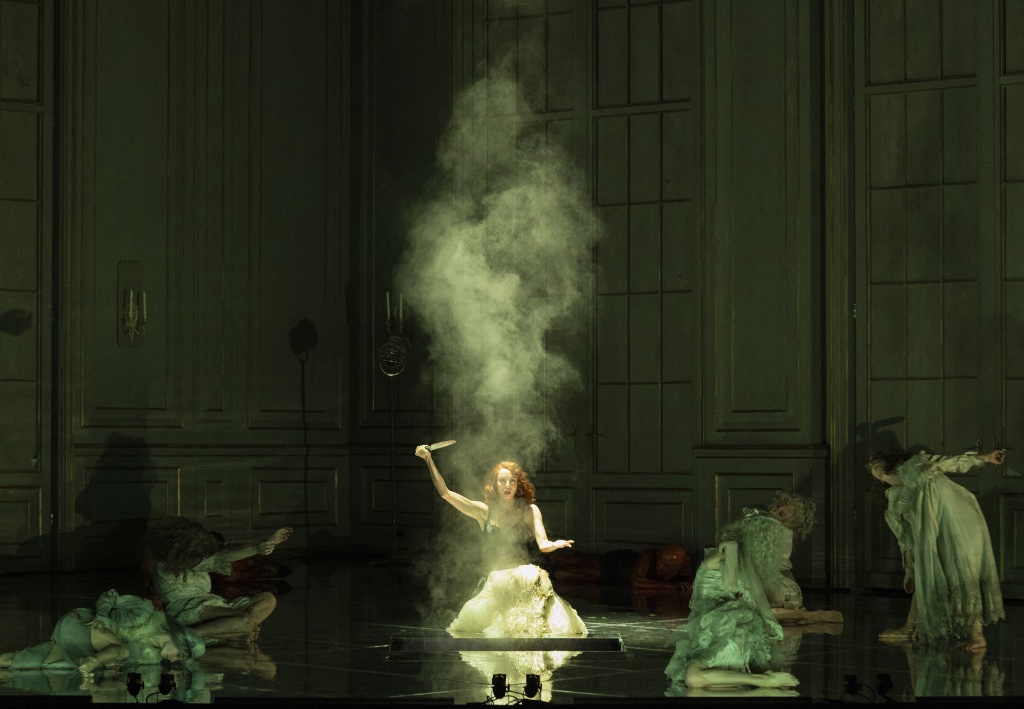
Marc-Antoine Charpentier’s opera Médée (called a tragédie lyrique) has had a lot of waiting to do. The dramatist Pierre Corneille wrote his version of the Medea myth as early as 1634, at the beginning of his career. Thomas Corneille, 19 years younger than his more famous brother, was then obliged to wait until 1693 for his libretto (based on Pierre’s play) to be performed in tandem with Charpentier’s music because Jean-Baptiste Lully held a monopoly on the right to stage operas until his death in 1687. Finally, the Charpentier/Corneille creation was premiered by the Académie Royale de Musique on December 4, 1693.
In other respects, the waiting did not end there, as, although Médée was enthusiastically supported by Louis XIV’s brother Philippe d’Orléans and Philippe’s son (also known as Philippe d’Orléans), who came to Paris on several occasions to watch the opera, it swiftly fell into obscurity for a couple of centuries, until William Christie and his orchestra Les Arts Florissants rediscovered it in the later years of the 20th century and performed and recorded it.
Scandalously, this production at the Palais Garnier is the first staging of it by the Paris Opera. On Wednesday evening, it felt like an enormous privilege to witness the now 79-year-old Christie conduct a magnificent work that he has done so much to revive. He makes a convincing case for the great originality of Charpentier’s music.
This production, by British director David McVicar, was first staged at the English National Opera in London in 2013. With some trepidation, I read in advance that McVicar had transported the story of Médée’s revenge upon her faithless husband Jason, who has turned his attention to Créuse, daughter of King Créon of Corinth, to the time of World War II. However, my fears were allayed by a colorful, intelligent and wittily choreographed production, with the use of stage machinery that pays appropriate tribute to the vogue for machine plays in the late 17th century.
By setting it in a palace or elegant stately home that has been recommissioned for the war effort (as was the case in Britain), McVicar preserves the grandeur needed for a story about kings, princes and princesses. The fact that the story is set in the middle of a war with many alliances between different factions (Jason from Thessaly, Créon from Corinth, Oronte, who is engaged to Créuse, from Argos) is given clarity by turning them into members of the Allied Forces, with Jason dressed in British naval uniform, Créon in French Army gear and Oronte as an American airman.
The figure of the sorceress Médée has long fascinated authors and dramatists. Charpentier and Thomas Corneille manage to present her as a complex figure, not simply a villain. The music she sings is often poignant, not least when her two young sons with Jason are onstage.
The five-act opera is well structured, with Act III providing a dramatic and emotional pivot to the entire story. The first half of the act shows Médée at her most sympathetic: the aria “Quel Prix de Mon Amour?,” exquisitely sung here by the young Franco-Italian mezzo-soprano Lea Desandre, makes her so believable and vulnerable that it is a real shock to find her just a few seconds later calling upon demons, who in this production seem to materialize out of the ground, to wreak her terrible revenge on all those who have wronged her. The final act is appropriately horrifying as Médée’s victims are variously stabbed or poisoned.
All the soloists are on top form, with excellent performances by tenor Reinoud Van Mechelen as Jason, soprano Ana Vieira Leite as Créuse, baritone-bass Gordon Bintner as Oronte, and veteran baritone Laurent Naouri as Créon, but the evening belongs to the magnificent Desandre.
Both Christie and Les Arts Florissants show how experienced they are in this repertoire, and it is a joy to see them playing with such verve. If you can cope with the tightly packed and knee-destroying Palais Garnier seats (yes, we know that most audience members were several inches shorter when the theater was built than they are now, but still…), call upon the sorceress Médée to get you tickets by any means possible.
Favorite